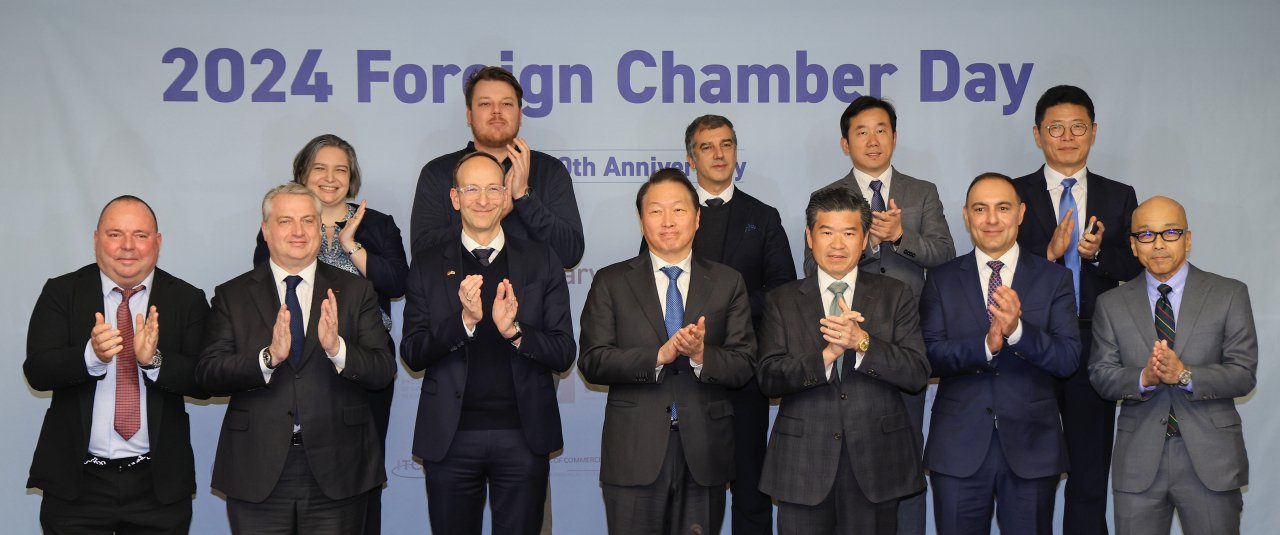 |
The Korea Chamber of Commerce and Industry Chairman Chey Tae-won (center, front row) poses with representatives of foreign chambers at 2024 Foreign Chamber Day held at the KCCI headquarters in Seoul on Wednesday. From left in the front row are Stefan Ernst, the president of the European Chamber of Commerce in Korea; Korean-French Chamber of Commerce Chairman David-Pierre Jalicon; Korean-German Chamber of Commerce Chairman Holger Gerrmann; Chey; American Chamber of Commerce in Korea Chairman James Kim; Turkish representative in Korea Atalan Metin; and Seoul Japan Club Chairman Kazuhiro Iguchi. In the second row from left are Lucinda Walker, director of the British Chamber of Commerce in Korea; Dutch Business Council Korea President Andreas Varkevisser; Italian Chamber of Commerce in Korea Chairman Andrea Verazzi; and Chinese Chamber of Commerce in Korea Vice Chairman Eric Ma. (Yonhap) |
Korea would be more attractive for global renewable energy and health care companies if they were given higher financial incentives and eased regulations, chiefs of foreign business lobby groups said Wednesday.
The Korea Chamber of Commerce and Industry held the 2024 Foreign Chamber Day with representatives of foreign business networking organizations to share opinions on difficulties faced by global firms operating here in the fields of economic cooperation, labor, trade and regulatory approval, as well as improvement measures.
“I believe that foreign investments have become a new force driving global industrial competition, especially in high-tech industries. … the management activities and policy suggestions of foreign companies can serve as barometers for upgrading our economy to global standards,” KCCI Chairman Chey Tae-won, who also doubles as SK Group's chairman, said at the meeting.
Presided over by Chey, the gathering was attended by some 10 business leaders including European Chamber of Commerce in Korea President Stefan Ernst, Seoul Japan Club Chairman Kazuhiro Iguchi and David-Pierre Jalicon, chairman of the French-Korean Chamber of Commerce and Industry.
“As Korea has many excellent conditions to become Asia's No. 1 regional headquarters, we hope that it will make efforts to attract global regional headquarters by providing more diverse incentives,” American Chamber of Commerce in Korea Chair James Kim said during the meeting.
“Despite various obstacles such as global supply chain disruption and geopolitical risks, Korea is an attractive investment destination that maintains a strong alliance with the US via free trade agreements and ally-shoring,” Kim said. Ally-shoring refers to manufacturing and sourcing from countries that are geopolitical allies.
According to the KCCI, foreign investment has increasingly become one of the two major pillars that provide great vitality to Asia’s fourth-largest economy, along with exports. Foreign direct investment in Korea reached an all-time high of $32.72 billion last year, hitting the $30 billion milestone for two consecutive years.
The Korea-German Chamber of Commerce and Industry Chair Holger Gerrmann suggested advancing the renewable energy system by enacting laws related to wind energy and increasing opportunities for cooperation in new industries such as the biopharmaceutical sector.
ECCK President Stefan Ernst picked climate change and digital economic cooperation as areas in which Korea and EU member countries should beef up partnerships, while upgrading the Korea-EU FTA.
The chiefs also suggested improving approval-related regulations, such as easing the standards for restricted substances related to metal accessories and shortening the approval process period for pharmaceutical products. They also requested improvements in the service sector, such as easing the shareholding ratio of foreign law firms.
“Foreign investment not only increases production capacity and capital power for economic growth but also has the effect of having an ally in Korea to deal with global issues together without having to go abroad directly,” KCCI Executive Vice Chairman Woo Tae-hee said.





![[Herald Interview] How Gopizza got big in India](http://res.heraldm.com/phpwas/restmb_idxmake.php?idx=644&simg=/content/image/2024/11/20/20241120050057_0.jpg)

